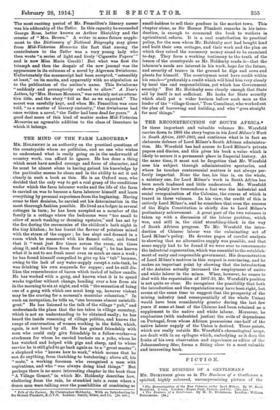THE MIND OF THE FARM TABOURER.* Mn. HOLDCNBY is an
authority on the practical questions of the countryside whom no politician, and no one who wishes to understand what is really going on in the underworld of country work, can afford to ignore. He has done a thing which must have needed courage and force of character, and he must be almost alone in having gained his knowledge by the particular means he chose and in the ability to set it out clearly in such a book as this. He is an Oxford man, who decided that the only way to get a real grasp of the conditions under which the farm labourer works and the life of the farm ie carried on was to become a farm labourer himself and learn everything by personal experience from the beginning. Having come to that decision, he carried out his determination in the most thorough fashion possible, Relived as a lodger in several cottages in turn; he has been accepted as a member of the family in a cottage where the bedrooms were ".too small to allow of much washing or dressing upstairs," and has sat by the fire during the ceremonies of the children's bath night in the tiny kitchen; he has learnt the flavour of potatoes mixed with the steam of the copper ; he has slept and dressed in a room which he measured with his flannel collar, and found that it "went just five times across the room, six times along it, and six times from floor to eeilieg" ; he has known what it is not to see fresh meat even so much as once .a week ; he has found himself compelled to give up his "tub" because, owing to the lack of any water-supply except a rain-tank, he was drinking his own soapsuds for supper; and be still dis- likes the remembrance of bacon which tasted of tallow candle. He has worked with a gang, and known what it is to spend weeks together without change, bending over a hoe from six in the morning to six at night, and with " the sensation of being one of a gang with which one must keep up, however violent may be the craving for a moment's muscular relaxation." In such an Occupation, he tells us, "one becomes almost unintelli- gent." He has listened to the talk of the village pub," and understands the place that the inn takes in village econdmy, which is not an understanding to be obtained easily; be has heard the inside reasoning of village politica, and knows the range of conversation of women working in the fields, which, again, is not beard by all. He has gained friendship with men who could only give friendship to a fellow-worker—a stockman for whom be carried buckets on a yoke, whom he has watched and helped with pigs and sheep, and to whose service he is still glad to go back again as to a "great master"; a shepherd who " knows how to work," which means that be can do anything, from thatching to butchering ; above all, his " mate," a working foreman who recognized a man with aspirations, and who " was always doing kind things." But perhaps there is no more interesting chapter in the book than "A Village Gemot," in which Mr. Holdenby describes how, sheltering from the rain, he stumbled into a room where a dozen men were talking over the possibilities of combining as • Polk of the Flarrote. By Chrintopher Holdenby. With an Introduction by Sir Rome Plunkett, K.O.Y.O. London: Smith, Sider, and Co. Lea net.]
small-holders to sell their produce in the market town. This chapter alone, as Sir Horace Plunkett remarks in his intro- duction, is enough to commend the book to workers in agricultural,. reform. It is a real contribution to practical policy, for the men whom Mr. Holdenby met had bought land and built their own cottages, and their work and the plan on which they raised the necessary money stand to be examined to-day. They form a working testimony to the truth of the lesson of the countryside as Mr. Holdenby reads.it—that the labourer's needs are interest in his work, hope for the future, and security of tenure in the ground be digs and sows and plants for himself. The countryman must have credit within his reach—"preferably a credit which will bind him very closely by local ties and responsibilities, yet which has Government security." But Mr. Holdenby, sees clearly enough that State aid by itself is not sufficient. He looks for State security which shall put a wider horizon before such men as the leader of the " village Gemot," Tom Connibear, who worked out the plan of borrowing and building, and who " goes straight for mos' things."














































 Previous page
Previous page